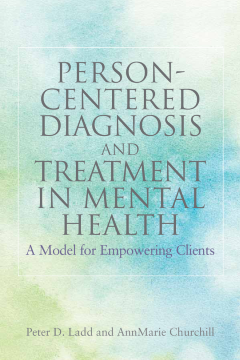
BOOK
Person-Centered Diagnosis and Treatment in Mental Health
Peter Ladd | AnnMarie Churchill
(2012)
Additional Information
Book Details
Abstract
Clients with mental health conditions are often diagnosed and treated using a strictly medical model of diagnosis, with little input from the client themselves.
This reference manual takes a person-centered, holistic approach to diagnosis and treatment, seeing the client as the unrecognized expert on their condition and encouraging their collaboration. This qualitative approach aims to find meaning in the experiences of the client, exploring the reasons behind their feelings and behaviour and taking the whole person into account. Designed to complement DSM assessments, the manual covers several different conditions including ADHD, depression, bulimia, and OCD, as well as mental health 'patterns' such as abuse, bullying, violence and loss. In each case, the client is involved in the diagnosis and treatment plan. The book features extended case studies, sample questions and treatment plans throughout.
This will be an essential reference book for all those involved in mental health diagnosis and treatment, including psychologists, psychiatrists, mental health counselors, clinical social workers, school counselors and therapists.
This resource is a reference manual for diagnosis and treatment of mental health conditions using a person-centred, holistic approach.
Counselling Today.
This book succeeds in its goal of offering an alternative model of mental health diagnosis and treatment that enhances the medical model with a client empowerment model. The authors provide a strong argument for the importance of a client empowerment approach. The book is unique in its inclusion of diagnosable disorders, and another strength is the inclusion of client and practitioner questions to guide the diagnosis and treatment process in a way that is empowering.
Donald Linhorst, Director of the School of Social Work, Saint Louis University, USA
I have no doubt that this book will enhance the clinical training and practice of counselors and other helping professionals. I cannot emphasize enough the positive impact of a person, rather than clinician-centered, orientation to helping. The subsequent focus on mental health patterns and symptoms, rather than disorders, provides a practical focus for clinicians on how to work with, rather than on, their clients. The cases provided in this book are outstanding.
Elizabeth A. Mellin, Ph.D., LPC, Assistant Professor, Department of Educational Psychology, Counseling, and Special Education, The Pennsylvania State University, USA
Peter D. Ladd is Coordinator of the Certificate of Advanced Studies Program in Counselling, St Lawrence University, New York, USA. He is also Clinical Supervisor of the Holistic Health and Wellness Program on the Akwesasne Mohawk Reservation, Canada. AnnMarie Churchill is a psychotherapist, researcher and professional trainer. She is Senior Therapist on the Holistic Health and Wellness Program, Akwesasne Mohawk Reservation.
Person-Centered Diagnosis and Treatment in Mental Health illustrates the value of a collaborative, ethical and empowered approach to mental health practice. Departing from the traditional medical model which flattens complexity for the sake of diagnosis, Ladd and Churchill offer clear and helpful guidelines for creating a holistic, humanistic and nuanced approach that foregrounds the humanity of people coming for treatment and the importance of humility and a collaborative vision for practitioners.
R. Danielle Egan, Professor of Gender and Sexuality Studies, St. Lawrence University, USA
This manual deals with nine disorders over seven chapters on mental health patterns... All of the mental health conditions examined are considered in great detail from the point-of-view of lived experiences, greatly enhanced by case stories... The unique person-centered approach described in the book is a very welcome contribution to reference manuals for people working in mental health services. Every condition is very thoroughly examined with remarkable insight into living with and seeking solutions to psychological disorders in collaboration with mental health practitioners. The strength of the insights is that it addresses behavioural aspects of mental illness in a non-judgemental and sensitive way. The discussions of each disorder provide excellent and thoughtful explanations of living with mental imbalances. If students preparing for work in the caring professions use this manual they would greatly increase their work satisfaction from enriched relationships and successful rehabilitation of their patients. The book contains no quick fixes, but rather concentrates on the growth and development of individuals collaborating with mental health providers in person-centered relationships.
Dr. Margot Lindsay, Research Department of Mental Health Sciences
European Journal for Person Centered Healthcare
